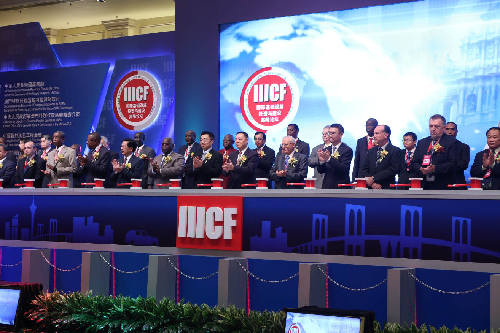What do Chinese enterprises bring to the world?
 0 Comment(s)
0 Comment(s) Print
Print E-mail China Today, September 8, 2015
E-mail China Today, September 8, 2015
|
|
|
The 6th International Infrastructure Investment and Construction Forum (IIICF) opens in Macao on June 4, 2015. |
The 6th International Infrastructure Investment and Construction Forum (IIICF), co-organized by China International Contractors Association and Macao Economic Services, opened in Macao on June 4, 2015. The two-day forum aimed at providing an international platform to exchange ideas, provide information, discover opportunities, and seek cooperation.
The contribution that Chinese enterprises have made to the world was highly commended by statesmen and international financing institutions at the forum, particularly when the topic focused on China's globalization in the field of infrastructure investment.
National projects cooperating with China
"The Asian Infrastructure Investment Bank (AIIB) is soildly supported by the Chinese government. China attaches great importance to infrastructure connectivity when launching special loan projects, which is in my eyes a timely solution," said Lim Sidenine, secretary of the State Ministry of Public Works and Transport of Cambodia. Lim expects Cambodia to cooperate with Chinese engineering companies and so increase production values.
Minister of Mines, Energy, and Water Development of Zambia Christopher Yaluma praised the time-honored cooperation between China and Zambia. "In the 1970s, China assisted the construction of the Tanzania-Zambia Railway," the minister said. The railway runs over 1,700 kilometers. Although it has endured nearly four decades of exposure to the elements, this railway is still a major line linking the two countries.
According to Yaluma, infrastructure construction has been set as the key priority in Zambia since 2011. At present, this sector contributes 56.5 percent of the country's GDP. In 2012, the Link Zambia 8000 project was launched, aiming at facilitating economic exchanges between the southern part of the country and other African countries via road construction. The first and second stages are expected to be completed in eight years.
"The project is budgeted at US $5.6 billion. But we are faced with a big financial challenge," the minister said. So the Chinese government is lending a hand again. "Ninety-five percent of the projects' contractors are Chinese companies and most proportions of the capital come from the Export-Import Bank of China. Now, we are working closely with Chinese contractors," the minister said.
Chinese enterprises have undertaken a good number of infrastructure projects in Africa, which have boosted local socio-economic development. In 2014, China and African countries signed new contracts valued at US $75 billion, US $53 billion of which have been achieved. In the next period, China will build partnerships with African countries in transnational and transregional infrastructure constructions.
"China has invested far more than any other country in infrastructure constructions," said Hans Schulz, vice president for the Private Sector and Non-Sovereign Guaranteed Operation of the Inter-American Development Bank, "We have seen that Chinese engineering and construction companies have been enhanced with the capabilities to undertake global infrastructure projects." For instance, China has a good partnership with Latin American and Caribbean states. Since 2010, it has become the second largest destination of Latin America's exports. At the same time, it is an important trading partner of Latin America.
Angie Toral Hidalgo, Ecuador's coordinating minister for strategic sectors, raised several power source infrastructure projects that have been launched jointly by China and Ecuador. "Take Coca Codo Sinclair hydroelectric facility for example. Jointly developed with Chinese contractors, this 1,500 MW project is the largest of its kind in our history and is expected to double the country's generating capacity."
According to Hidalgo, Ecuador plans to increase the country's generating capacity to 8,000 MW by 2016. As 90 percent of it will be generated by hydro power, it is estimated to decrease carbon dioxide emissions by seven million tons. She expressed hope that the country's energy and electric power development will be enhanced by cooperation with China.
The Nestor Kirchner Hydropower Station and the Jorge Saipan Nick Hydropower Station are key projects jointly constructed by China and Argentina. Liscia Sergio from Argentina's Ministry of Federal Planning, Public Investment and Services revealed that with the investment of US $7.4 billion, the generating capacity of the two stations will reach 1,740 MW. It is doubtless the most successful hydropower project in Argentina and will generate about 7,000 job opportunities.







Go to Forum >>0 Comment(s)